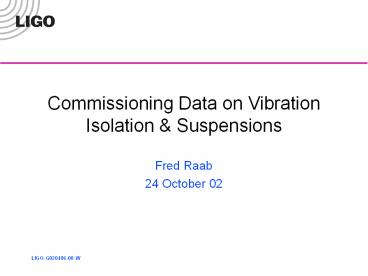Commissioning Data on Vibration Isolation PowerPoint PPT Presentation
Title: Commissioning Data on Vibration Isolation
1
Commissioning Data on Vibration Isolation
Suspensions
- Fred Raab
- 24 October 02
2
Vibration Isolation Systems
- Reduce in-band seismic motion by 4.5 6.0 orders
of magnitude - Little or no attenuation below 20Hz
- Large range actuation for initial alignment and
drift compensation - Quiet actuation to correct for Earth tides,
microseism at 0.15 Hz, and active stack damping
during observation
BSC Chamber
HAM Chamber
3
Seismic Isolation Springs and Masses
4
Seismic System Performance
HAM stack in air
BSC stackin vacuum
HAM chamber view
5
Earth-Tide CompensationUsing Fine Actuation
Earth tide magnitude is hundreds of fringes
Feedback
Feedforward
Calibration
6
Tidal Compensation Data
Tidal evaluation on 21-hour locked section of S1
data
Predicted tides
Feedforward
Feedback
Residual signal on voice coils
Residual signal on laser
7
Microseism
Microseism at 0.12 Hz dominates ground
velocity
Trended data (courtesy of Gladstone High School)
shows large variability of microseism, on
several-day- and annual- cycles
Reduction by feed-forward derived from
seismometers
8
Core Optics Suspension and Control
Optics suspended as simple pendulums
Local sensors/actuators provide damping and
control forces
Mirror is balanced on 1/100th inch diameter wire
to 1/100th degree of arc
9
Background Forces in GW Band Thermal Noise
kBT/mode
xrms ? 10-11 m f lt 1 Hz
xrms ? 2?10-17 m f 350 Hz
xrms ? 5?10-16 m f ? 10 kHz
Strategy Compress energy into narrow resonance
outside band of interest ? require high
mechanical Q, low friction
10
Actuation/Isolation Transfer Function Should Be
1/f2
11
Thermal Noise Observed in 1st Violins on H2, L1
During S1
Almost good enough for tracking calibration.
PowerShow.com is a leading presentation sharing website. It has millions of presentations already uploaded and available with 1,000s more being uploaded by its users every day. Whatever your area of interest, here you’ll be able to find and view presentations you’ll love and possibly download. And, best of all, it is completely free and easy to use.
You might even have a presentation you’d like to share with others. If so, just upload it to PowerShow.com. We’ll convert it to an HTML5 slideshow that includes all the media types you’ve already added: audio, video, music, pictures, animations and transition effects. Then you can share it with your target audience as well as PowerShow.com’s millions of monthly visitors. And, again, it’s all free.
About the Developers
PowerShow.com is brought to you by CrystalGraphics, the award-winning developer and market-leading publisher of rich-media enhancement products for presentations. Our product offerings include millions of PowerPoint templates, diagrams, animated 3D characters and more.

